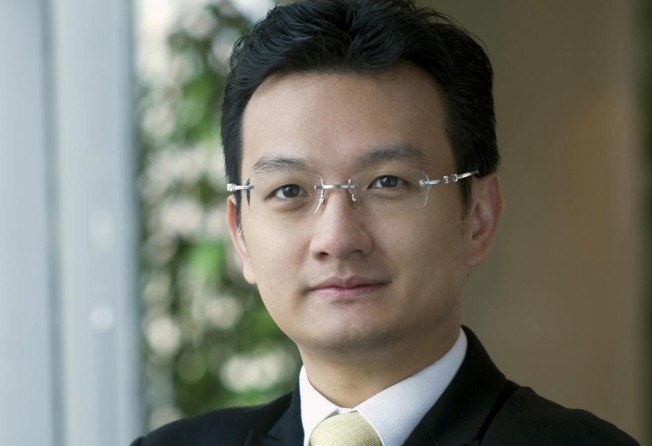Powerlong president spells out strategy for property developer
Having led his company's push into commercial real estate when he first joined the firm in 2003, Hoi Wa-fong now wants to focus on the quality of the projects and be the biggest developer in Shanghai in five years

Hoi Wa-fong joined Powerlong Real Estate Holdings, the company established in 1992 by his father, in 2003. Then 25, he led the company's foray into commercial real estate and at the end of his first year, he was promoted to vice-president of the firm.
Hoi now serves as the president and is determined to see Powerlong become Shanghai's biggest commercial real estate developer in five years.
Hoi's transition to the top of his father's company is somewhat of a rarity at a time when many of the mainland's established private firms are experiencing succession problems because the second generation prefers to pursue opportunities outside family companies.
"I'm open to new things and don't have a strong bias either way," Hoi said. "I would not have achieved what I have today if not for the initial stage [in my father's firm].
"So far, everything has been smooth."
What position does Powerlong hold as a developer of Shanghai community commercial properties and what is your plan for expansion over the next five years?
We have been doing commercial property development [since 2003]. We now have 55 projects across 26 cities on the mainland. In recent years, we have been focusing on the Yangtze River Delta, which has 24 projects including nine in Shanghai. We are lucky to have been operating in Shanghai starting six years ago.
The timing was very good. At that time, no other developer was doing the same. Most of our projects in Shanghai are above subway stations. That is our model.
Our rivals here are mainly the Dalian Wanda Group and Bailian Group.
Our strategy has been to first focus on quality rather than quantity of projects, and secondly, to focus on the Shanghai market. We have devoted more than 70 per cent of the company's resources, including workers and capital, in Shanghai.
Our aim in the next five years is to stay among the mainland's top 50 developers - we are now ranked 34th by consultancy China Real Estate Index Academy - and in Shanghai's top five. In the ranking of commercial property developers, we want to be among the top five across the country and No1 in Shanghai.
Some residential developers are moving into the commercial real estate business, which is already facing overcapacity. The competition in Shanghai is fierce, with top Hong Kong developers in the market. Meanwhile, the industry is also facing challenges from e-commerce. How do you see the competitive situation?
My feeling about the competition is contrary to what you have said.
The competition in the commercial property sector is not heating up, but cooling down.
In the past, everyone has basically been doing the same thing but market resources are limited. So everyone is hungry. The result is the survival of the strongest. Now there are no more than 10 commercial property developers left.
In the future, only specialised developers which focus on quality and customer services will survive. Others, even the big players, will be pushed out.
Market resources are limited, including talent. Financial institutions are highly wary of lending to commercial property developers. But they will support well located projects and top professional players. That means industry divergence will accelerate.
We do not feel heated competition even in a good market such as Shanghai.
So you don't think land prices are too high in Shanghai?
Of the land parcels for our nine projects in Shanghai, we bought six at [market] bottom price and three at a small premium.
For commercial property, the land market is indeed not very competitive because strong players can set selling prices of finished projects at double the levels of weaker rivals. That means a lot of rivals cannot compete with us in the land market.
Of course, competition in the land market for residential property projects is fierce.
One interesting phenomenon in the residential market is that all developers think alike - all seek safe haven in first-tier cities. So land competition is extremely heated. I attended more than 10 [residential] land auctions last year and I am not going any more because the price is too high.
In today's residential market, the land price allows developers little profit, so they have to depend on home prices rising and avoid making any mistakes themselves.
There are risks even in first-tier cities, where sales are the strongest across the country.
I would suggest everyone remain conservative.
There are two kinds of developers who are aggressive now: those running out of land reserves and must replenish; and those wanting to make their first foray into first-tier cities.
We have built up a sufficient land bank over the past three years and are in no rush. Our strategy is to buy only when the price is reasonable.
What about marketing and funding costs? What is your expectation for profit margins this year?
Traditional marketing methods no longer work well. We are using a lot of agencies to help bring in customers. Marketing cost is not going down but how it is now spent is a lot different from before.
We are confident we can cut funding costs further through bonds and securitisation.
Our profit margin this year will be about the same as last year.
Are your commercial property projects for hold or sale?
Half of our assets are residential and the other half commercial. The residential part is all for sale. For the commercial part, 60 per cent is for hold and 40 per cent for sale.
We will not sell one square metre of our shopping centres. But street shops, office towers and serviced apartments are all for sale.
Funding cost is still expensive. So developers need to sell part of their projects to maintain cash flow.